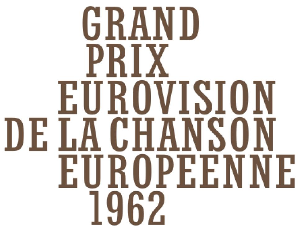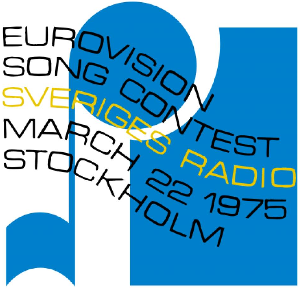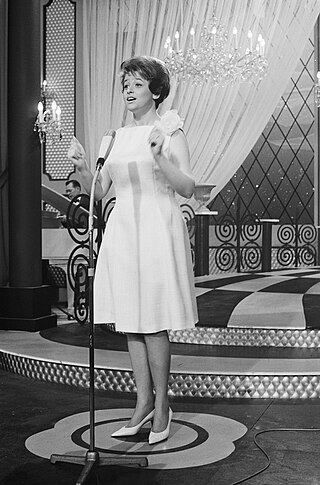
The Eurovision Song Contest 1962 was the 7th edition of the annual Eurovision Song Contest. It took place in Luxembourg City, Luxembourg, following the country's victory at the 1961 contest with the song "Nous les amoureux" by Jean-Claude Pascal. The contest was organised by the European Broadcasting Union (EBU) and host broadcaster Compagnie Luxembourgeoise de Télédiffusion (CLT), and was held at the Villa Louvigny on Sunday 18 March 1962 hosted by the Luxembourgish speaker Mireille Delannoy. This remains the last time that the final of the contest was not held on a Saturday, as since 1963 the final of the contest has consistently been held on a Saturday evening.

The Eurovision Song Contest 1966 was the 11th edition of the annual Eurovision Song Contest. It took place in Luxembourg City, Luxembourg, following the country's victory at the 1965 contest with the song "Poupée de cire, poupée de son" by France Gall. Organised by the European Broadcasting Union (EBU) and host broadcaster Compagnie Luxembourgeoise de Télédiffusion (CLT), the contest was held at the Villa Louvigny on 5 March 1966 and was hosted by Luxembourgish television presenter Josiane Chen.

The Eurovision Song Contest 1971 was the 16th edition of the annual Eurovision Song Contest. It took place in Dublin, Ireland, following the country's victory at the 1970 contest with the song "All Kinds of Everything" by Dana. Organised by the European Broadcasting Union (EBU) and host broadcaster Radio Telefís Éireann (RTÉ), the contest was held at the Gaiety Theatre on 3 April 1971, and was hosted by Irish television presenter Bernadette Ní Ghallchóir.

The Eurovision Song Contest 1974 was the 19th edition of the Eurovision Song Contest, held on 6 April 1974 in the Dome in Brighton, United Kingdom. Organised by the European Broadcasting Union (EBU) and host broadcaster the British Broadcasting Corporation (BBC), and presented by Katie Boyle, this was the fifth time that the United Kingdom had staged the contest.

The Eurovision Song Contest 1975 was the 20th edition of the Eurovision Song Contest, held on 22 March 1975 in the Sankt Eriks-Mässan in Stockholm, Sweden. Organised by the European Broadcasting Union (EBU) and host broadcaster Sveriges Radio (SR), and presented by Karin Falck, the contest was held in Sweden following the country's victory at the 1974 contest with the song "Waterloo" by ABBA.

The Eurovision Song Contest 1997 was the 42nd edition of the annual Eurovision Song Contest, held on 3 May 1997 at the Point Theatre in Dublin, Ireland. Organised by the European Broadcasting Union (EBU) and host broadcaster Radio Telefís Éireann (RTÉ) and presented by Carrie Crowley and Ronan Keating, the contest was held in Ireland following the country's victory at the 1996 contest with the song "The Voice" by Eimear Quinn. The 1997 contest was the seventh – and to date last – edition to be staged in Ireland, as well as the fourth to be produced by RTÉ in five years. The Point Theatre served as the host venue for the third time, following the 1994 and 1995 contests, becoming the only venue to have been the site of three Eurovision Song Contests.

Germany has officially participated in every Eurovision Song Contest since its inaugural edition in 1956, except in 1996 when its entry did not qualify past the audio-only pre-selection round, and consequently was not seen in the broadcast final and does not count as one of Germany's 67 appearances. No other country has been represented as many times. Along with France, Italy, Spain and the United Kingdom, Germany is one of the "Big Five" countries that are automatically prequalified for the final, due to being the largest financial contributors to the European Broadcasting Union (EBU). The final is broadcast in Germany on ARD's flagship channel, Das Erste.

Luxembourg has participated in the Eurovision Song Contest 38 times since its debut at the first contest in 1956. The Luxembourgish national broadcaster, RTL Luxembourg, is responsible for organising the country's participation in the contest. The nation participated in all but one event between 1956 and 1993, only missing the 1959 contest. After finishing among the bottom seven countries in 1993, Luxembourg was relegated and prevented from competing in 1994. The nation declined to return to the contest in 1995, and would make no further appearances over the next three decades. The country returned to the event for the first time in 31 years in 2024.

"Jack in the Box", written by David Myers and composed by John Worsley, was the United Kingdom's entry at the Eurovision Song Contest 1971, performed by the Northern Irish singer Clodagh Rodgers.
Luxembourg participated in the Eurovision Song Contest 1992 with the song "Sou fräi" written by Jang Linster and Ab van Goor. The song was performed by Marion Welter and the band Kontinent, which was internally selected by the Luxembourgish broadcaster RTL Hei Elei (RTL) in March 1992 to represent Luxembourg in Malmö, Sweden. RTL organised a national final in order to select Marion Welter and Kontinent's song and "Sou fräi" emerged as the winning song on 22 March 1992 following a public postcard vote.
Monique Melsen is a Luxembourgish singer, best known for her participation in the 1971 Eurovision Song Contest. Melsen is one of only eight native Luxembourgish to have represented the country at Eurovision in 37 years of participation.
Belgium was represented by Pierre Rapsat, with the song "Judy et Cie", at the 1976 Eurovision Song Contest, which took place on 3 April in The Hague. Rapsat was the winner of the Belgian national final for the contest, held on 21 January.
Belgium was represented by Serge and Christine Ghisoland, with the song "À la folie ou pas du tout", at the 1972 Eurovision Song Contest, which took place in Edinburgh on 25 March. "À la folie ou pas du tout" was the winner of the Belgian national final for the contest, held at the RTB studios in Brussels on 15 February. The Ghisolands had previously participated in the Belgian final in 1970.
Luxembourg was represented by French singer France Gall, with the song "Poupée de cire, poupée de son", at the 1965 Eurovision Song Contest, which took place on 20 March in Naples. The song, composed by Serge Gainsbourg, went on to bring Luxembourg their second Eurovision victory.
Luxembourg was represented by Spanish duo Baccara, with the song "Parlez-vous français ?", at the 1978 Eurovision Song Contest, which took place on 22 April in Paris. For only the second time, broadcaster RTL organised a public national final rather than their usual method of internal selection.
Luxembourg was represented by well-known German singer Jürgen Marcus, with the song "Chansons pour ceux qui s'aiment", at the 1976 Eurovision Song Contest, which took place on 3 April in The Hague. For the second time ever, broadcaster RTL organised a public national final rather than their usual method of internal selection. Marcus was the first German singer to represent Luxembourg, as their 1974 representative Ireen Sheer, although German-based, was British by birth.
Luxembourg participated in the Eurovision Song Contest 1989 with the song "Monsieur" written by Maggie Parke, Gast Waltzing, Yves Lacomblez and Bernard Loncheval. The song was performed by the band Park Café, which was internally selected by the Luxembourgish broadcaster Radio Télévision Luxembourg (RTL) in February 1989 to represent Luxembourg in Lausanne, Switzerland. RTL organised a three-song national final in order to select Park Café's song and "Monsieur" emerged as the winning song following a public televote held via television and radio on 5 and 6 March 1989.

Finland was represented by Marion Rung, with the song "Tipi-tii", at the 1962 Eurovision Song Contest, which took place on 18 March in Luxembourg City. "Tipi-tii" was chosen as the Finnish entry at the national final organised by broadcaster Yle and held on 15 February. Rung would represent Finland again in the 1973 contest, also held in Luxembourg.
Portugal was represented by Tonicha, with the song "Menina do alto da serra", at the 1971 Eurovision Song Contest, which took place on 3 April in Dublin. "Menina do alto da serra" was chosen as the Portuguese entry at the Grande Prémio TV da Canção Portuguesa on 11 February.
Luxembourg participated in the Eurovision Song Contest 2024 in Malmö, Sweden, returning after an absence of 31 years since its last participation in 1993. In order to select the country's entry for the contest, the Luxembourgish broadcaster RTL organised the national final Luxembourg Song Contest, which was won by "Fighter" performed by Tali.









